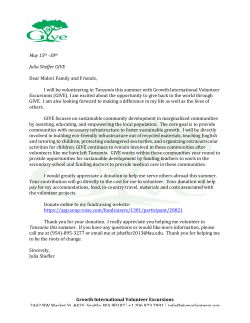
Tanzania Fact Sheet - Better Immunization Data Initiative
Better Immunization Data Initiative in Tanzania PATH/Debbie Kristensen Better data plus better decisions will lead to better health outcomes Routine immunizations and new vaccine introductions have proven to be two of the best investments for improving health in Tanzania and around the world. Immunization rates in Tanzania have increased significantly during the past decade, reaching roughly 90 percent. Achieving even higher rates will require better data. The BID Initiative in Tanzania has partnered with the Ministry of Health and Social Welfare (MOHSW) through the Immunization and Vaccines Development (IVD) Program. Together, these partners will create an environment where reliable, easily accessed, and actionable data can be used to increase immunization rates. the challenge Government officials working to enhance immunization coverage in Tanzania have been hampered by limited and often unreliable and inaccurate data that may not reflect the actual challenges on the ground. In partnership with the MOHSW and IVD Program, the BID Initiative identified a number of critical data-related challenges: • Inaccurate or uncertain denominators for calculating immunization rates. • Difficulty identifying children who do not start immunization or who drop out (defaulter tracing). The Better Immunization Data (BID) Initiative’s vision is to enhance immunization and overall health service delivery through improved data collection, quality, and use. Led by PATH and funded by the Bill & Melinda Gates Foundation, the initiative will identify practical, country-owned, country-led solutions in immunization that could spread to other health interventions. It began by evaluating countries in sub-Saharan Africa to identify demonstration country partners. The process included a preliminary desk review, followed by in-depth analysis of demographics, governance, data from the Expanded Program on Immunization, eHealth infrastructure, and other factors. After an initial round of scoping visits followed by in-depth visits to potential implementation sites, Tanzania and Zambia emerged as strong country partners. • Poor data visibility into supplies at the facility level to district-level data and stock. • Complex data collection forms and tools. • Insufficient supply chains and logistics. • Inadequate data management and use capacity at all levels of the health system. The BID Initiative, led by PATH, has partnered with the Ministry of Health and Social Welfare through the Immunization and Vaccines Development Program. to ensure that proposed solutions will work not only in Tanzania but also in many other countries. implementation phase Intervention design, testing, and fine-tuning has been completed in the Arusha region and we are now in the implementation phase (see Figure 1). Intermediate progress reviews will document lessons learned and further improve the interventions based on these lessons. After implementation in the Arusha region, the interventions will be scaled up to other parts of Tanzania. PATH/Doune Porter We are also actively seeking additional resources to help Tanzania plan for national scale. If the initiative is successful, a true tipping point will occur. All levels of Tanzania’s health system will have the ability to access, analyze, and act upon accurate immunization data—anytime, anywhere, resulting in improved health outcomes. interventions The Arusha region was chosen as a test site based on immunization challenges due to its porous border with Kenya; its mix of urban, peri-urban, and rural settings; and its pastoral communities. The BID Initiative has been designing and testing and will roll out the following interventions to help overcome challenges in increasing immunization coverage: Figure 1. Number of facilities that will implement interventions in each area within the Arusha region. KENYA 22 • • • • Electronic immunization registry. Automated, simplified report generation. Supply chain systems tools. Barcodes on child health cards and vaccine supplies. • Targeted supportive supervision for health workers. • Peer support networks. Longido 25 Ngorongoro 30 Monduli 38 Meru In addition, the initiative established a User Advisory Group to ensure that identified interventions reflect the reality on the ground and can be sustained by the people who will actually use them, as well as a peerto-peer learning network with representatives from sub-Saharan African countries grappling with similar challenges. The BID Learning Network is a platform to offer ideas, share perspectives, and provide feedback 38 60 Karatu 40 Arusha DC Arusha City TANZANIA milestones timeline Grant awarded Bill & Melinda Gates Foundation awards grant. 2013 Identify and test Solutions for Tanzania identified and tested, implementation phase in Arusha region begins. 2014 2015 Learning network Peer learning network established to share innovations. 2016 2017 2018 Expansion Interventions expanded to other regions in Tanzania. Better Immunization Data (BID) Initiative • PATH’s Tanzania Office Street Address Amani Place Building, 10th Floor Ohio Street. Opp. Serena Hotel Mailing Address P.O. Box 13600 Dar es Salaam +255-22-212 2398 www.bidinitiative.org bidinitiative@path.org March 2015
© Copyright 2025













